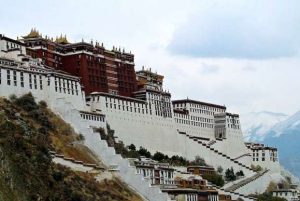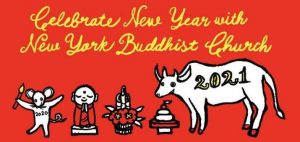
The story of Butcher Jing in Tang dynasty China
The following episode is recorded in Part 28 of Collected Records of the Buddha:*
In Chang’an, during Tang dynasty (618–907) times, there was a butcher surnamed Jing. Because Master Shandao urged people to undertake Amitabha-recitation, many had stopped eating meat. Butcher Jing resented him deeply. With a knife in his hand, he entered Shandao’s monastery with the intention of killing the monk.
Master Shandao pointed to the west and manifested a vision of the Pure Land. Jing immediately repented and sought rebirth in the Land of Bliss. He climbed a tall tree, reciting the name of Amitabha Buddha; he then fell from the tree and died.
Onlookers saw an emanation Buddha lead his spirit out of the top of his head. The deliverance of Amitabha Buddha is always present, everywhere. It attaches no preconditions, and does not discriminate between black and white, or good and bad.
Anyone who recites Amitabha’s name and aspires to rebirth in the Pure Land will achieve it.
Master Shandao was able to touch others with his compassion. On seeing his face, moral seekers shed all their negative intentions.
Reactions upon reading this account
This is a very famous story in China. The title of this article is actually a Chinese idiom that teaches us a lesson: as an evil man can be transformed into a kind one in an instant, everyone deserves the opportunity to turn over a new leaf by truly repenting.
However, some people may have a negative reaction after reading this story, such as: “What? It’s suicide, although religiously motivated. There should be nothing in the Pure Land sutras to justify suicide, even to attain the Pure Land. It is very strange and repugnant to think that the Buddha would approve of ordinary people taking their own lives.”
Or: “Why did Master Shandao not prevent the butcher from committing suicide and jumping from the tree? Conversely, the incident or tragedy was praised as highly virtuous. Isn’t that ridiculous?”
Another thing that may disturb and confuse readers is the idea of killing oneself in an attempt to reach the Pure Land faster. Strangely, the story may have a negative impact even on Pure Land practitioners.
Nevertheless, is it possible to have a positive reaction after reading this account?
What the story is telling us
While it is true that this is a story about a butcher who “committed suicide” by jumping from a tree after his mind was transformed by Master Shandao, we should remember that the latter was a manifestation body of Amitabha Buddha. Master Shandao had the ability to reveal the Land of Bliss to the butcher, who immediately expressed the earnest aspiration to be reborn there right away.
Thus, butcher Jing was acting under Master Shandao’s guidance and specifically for the purpose of attaining rebirth in the Land of Bliss. Auspicious signs confirming that he had taken rebirth there were witnessed by a number of spectators. The incident should therefore be regarded not as an act of “suicide,” but as a miracle. The story tells us that even a butcher who had killed numerous pigs and cows could be reborn in the Land of Bliss.
Nevertheless, such a strong reaction based on the desire to attain rebirth in the Pure Land is not generally accepted and may lead to misunderstandings; even though the butcher’s aspiration to go to the Pure Land is admirable, people should not imitate his behavior.
Going back to the incident, we see that Master Shandao illustrated the special features of Pure Land Buddhism, the practice of which provides ordinary people with transcendental benefits. He brought Buddhism from the grand Buddhist halls, where it was reserved for the elite, to the general public and made it applicable to daily life, demonstrating that all ordinary beings can enjoy the benefits of the unsurpassed Buddha Dharma.
There is another story, in the Lotus Sutra, about a great bodhisattva who burns himself in order to make an offering to the Buddha. Nowadays, some Buddhist monastics and devotees imitate this tradition and burn their arms or even their foreheads in religious services. As it draws criticism from the community, this kind of offering is not encouraged, and is now in fact prohibited in many Buddhist temples.
The most appropriate time to leave the world
The story begs another question: should we request Amitabha Buddha to come to receive us as early as possible? Does this mean we are earnest in seeking rebirth with respect to aspiration? Why can’t we be reborn in the Land of Bliss immediately if we have already determined the destiny of our next life?
This situation varies according to the individual. In general, the factors deferring our rebirth in the Pure Land to the natural end of our life may include the following:
1. Our karmic conditions have not yet ripened.
2. We are afraid of death.
3. We still have some things left to do in this life.
4. We are attached to worldly life.
There is no need for pristine Pure Land practitioners to ponder the above. Let us simply leave the matter of our rebirth entirely to Amitabha Buddha, who has the wisdom and capacity to resolve all our issues so that we can be reborn under the most favorable circumstances and to our complete satisfaction.
*Published in Master Huijing, Master Shandao: A Brief Biography (English translation by Householder Jingtu)






